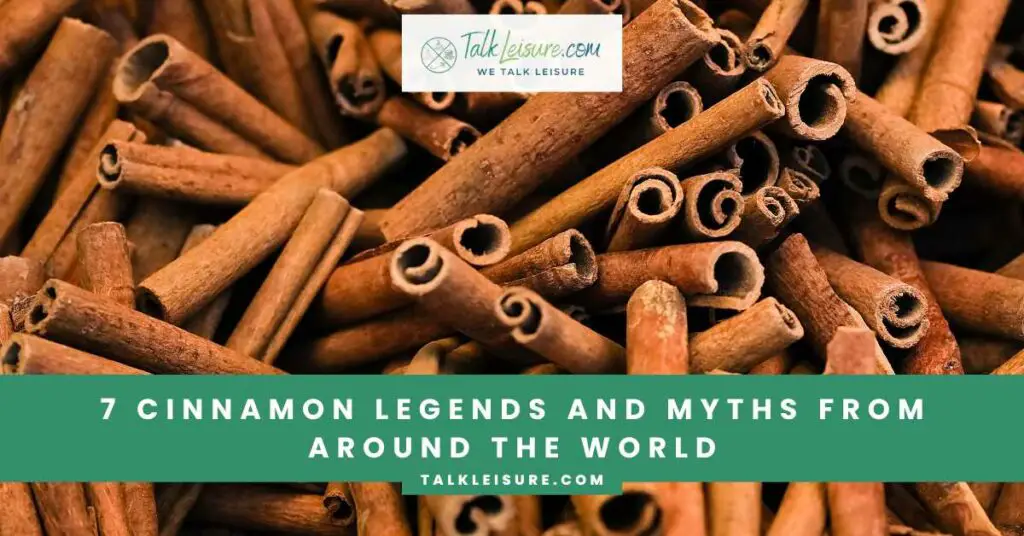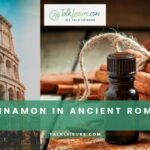Cinnamon, a spice derived from the bark of trees, has captivated people throughout history with its rich aroma and distinct flavor.
This blog explores the allure of cinnamon, its historical significance, and the enduring fascination with its legends and myths.
Ancient Egypt: Cinnamon as a Sacred Spice
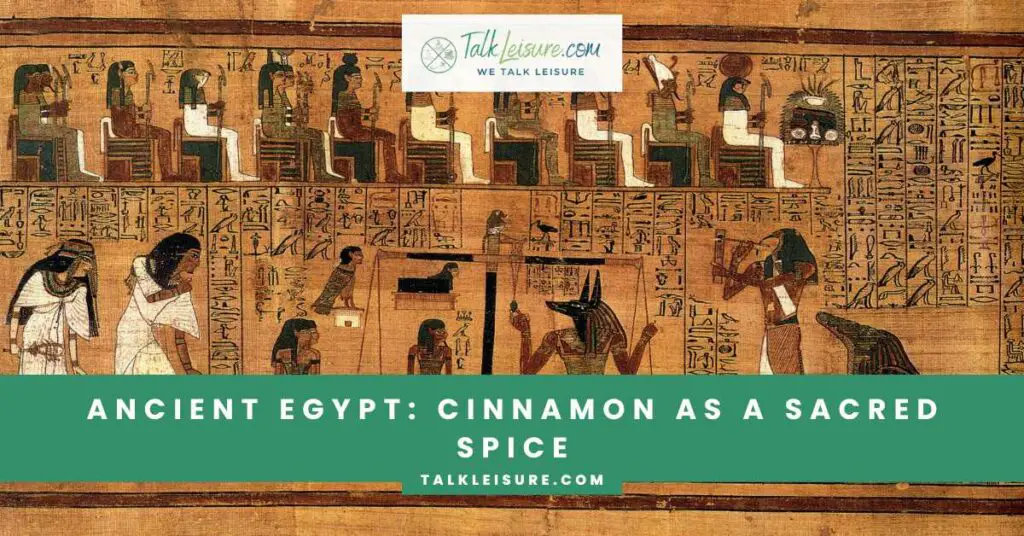
Cinnamon as an Offering to Gods and Pharaohs
– Cinnamon held a special place in ancient Egyptian culture, where it was considered a sacred spice.- It was believed that the gods themselves cherished the aroma and taste of cinnamon, making it an essential offering in religious rituals and ceremonies.- Pharaohs and nobility were also seen as deserving of the precious spice, as a symbol of their divine status and power.- The inclusion of cinnamon in embalming rituals further emphasized its significance in the afterlife journey of the deceased.
The Belief in Cinnamon’s Healing and Protective Properties
– In addition to its spiritual significance, cinnamon was also valued for its medicinal properties in ancient Egypt.- It was believed to have healing and protective qualities, particularly in promoting digestion and improving overall well-being.- Cinnamon was used in various remedies and formulas, helping to alleviate symptoms of illness and enhance vitality.- Its distinct flavor and aroma also made it a popular choice as a natural breath freshener.
Throughout the ages, cinnamon has retained its allure and continues to be cherished for its rich history and captivating legends. From ancient Egypt to the present day, this spice has been hailed as a symbol of luxury, bestowed with mystical properties, and cherished for its delightful taste and aroma. Its enduring fascination is a testament to its timeless appeal and its place as one of the world’s most beloved spices.
Ancient Greece: Cinnamon as a Symbol of Wealth and Power
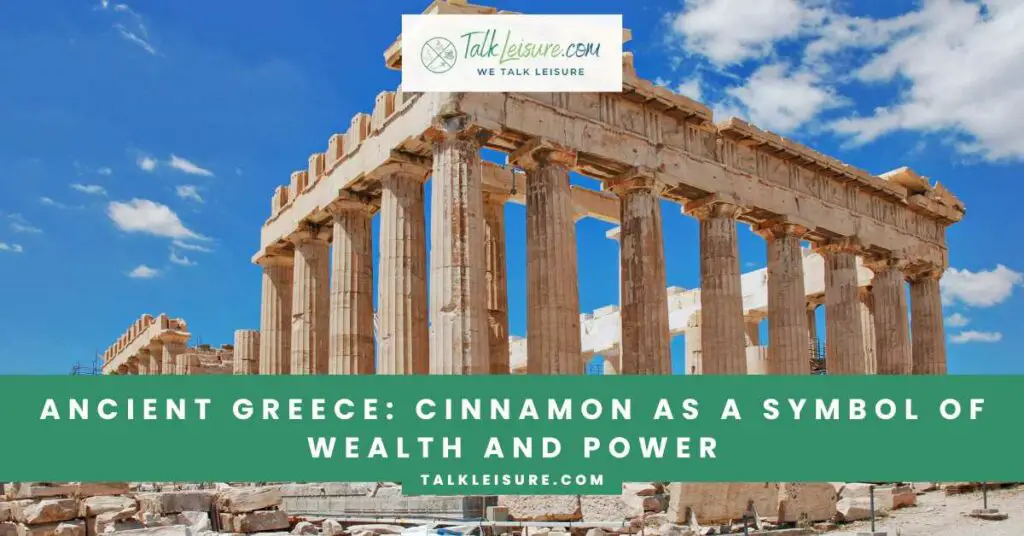
Cinnamon’s Role in Ancient Greek Mythology
– In ancient Greek mythology, cinnamon was associated with the goddess Aphrodite, the goddess of love and beauty.- It was believed that Aphrodite herself was so enamored by the aroma of cinnamon that she considered it an essential ingredient in her rituals and offerings.- Cinnamon was also believed to have the power to enhance desire and passion, further solidifying its connection to the goddess of love.
The Connection Between Cinnamon and Ancient Greek Rulers
– Just like in ancient Egypt, cinnamon held a special place among the rulers of ancient Greece.- The spice was considered a symbol of wealth and power, and only the nobility and high-ranking officials had access to it.- Cinnamon was used in elaborate feasts and banquets hosted by Greek rulers, adding a touch of luxury and sophistication to the occasions.- The rarity and exotic nature of cinnamon made it a coveted commodity, often obtained through trade with distant lands.
Throughout history, cinnamon has been more than just a spice. From its sacred status in ancient Egypt to its association with love and power in ancient Greece, cinnamon has transcended cultures and time periods. Its rich and enchanting history continue to fascinate people today, making it a beloved spice that adds flavor and allure to our lives.
Indian Mythology: Cinnamon as a Divine Spice
Cinnamon’s Significance in Hindu Mythology
– In Hindu mythology, cinnamon holds great significance and is considered a sacred spice.- It is believed to have medicinal properties and is often used in Ayurveda, the ancient Indian system of medicine.- Cinnamon is associated with warmth and vitality, and is believed to bring balance and harmony to the body.
The Association of Cinnamon with Deities and Rituals
– In Hindu rituals and ceremonies, cinnamon is often used as an offering to deities.- It is believed that the aroma of cinnamon pleases the gods and goddesses and brings their blessings.- Cinnamon is also used in religious ceremonies, particularly during festivals and auspicious occasions.- The spice is believed to purify the space and create a positive atmosphere for worship and prayer.
With its divine significance and association with deities, cinnamon plays an important role in Hindu mythology and religious practices. Its warm and comforting aroma adds depth and spirituality to rituals and ceremonies, creating a sacred ambience. Whether it is used in Ayurvedic remedies or as an offering to gods and goddesses, cinnamon continues to be revered and cherished in Indian culture.
Chinese Folklore: Cinnamon as a Life-prolonging Spice
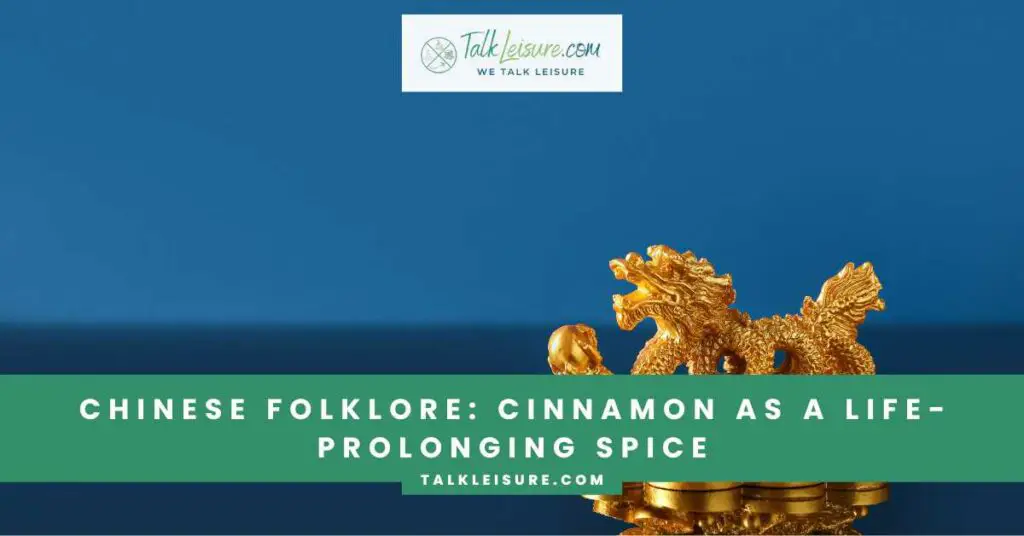
Cinnamon’s Role in Traditional Chinese Medicine
– In traditional Chinese medicine, cinnamon is highly valued for its numerous health benefits.- It is believed to have warming properties that help improve circulation and digestion.- Cinnamon is often used to treat conditions such as colds, digestive issues, and menstrual disorders.- It is also considered a natural remedy for boosting energy and vitality.
The Belief in Cinnamon’s Ability to Enhance Longevity
– Chinese folklore associates cinnamon with the idea of longevity and living a long, healthy life.- It is believed that consuming cinnamon regularly can help extend one’s lifespan.- Cinnamon is often included in herbal tonics and teas that aim to promote longevity.- The spice is seen as a symbol of good health and vitality in Chinese culture.
Cinnamon holds a special place in traditional Chinese medicine and folklore, being revered for its potential to improve health and prolong life. Its warming properties and various health benefits make it a valuable ingredient in herbal remedies. The belief in cinnamon’s ability to enhance longevity has been passed down through generations, making it an important part of Chinese culture. Whether consumed in teas or used in culinary preparations, cinnamon continues to be appreciated for its potential to promote well-being and vitality.
Medieval Europe: Cinnamon as a Mysterious and Magical Spice
Cinnamon’s High Value During the Middle Ages
– During the Middle Ages, cinnamon was highly prized and considered a luxury spice.- It was used as a status symbol and a sign of wealth and power.- The high demand for cinnamon drove up its price, making it a valuable commodity in medieval Europe.- Cinnamon was imported from the East and was a popular ingredient in various dishes and beverages.- It was also used in perfumes and for medicinal purposes.
The Portrayal of Cinnamon in Medieval Legends and Fables
– Cinnamon was often associated with mystery and enchantment in medieval legends and fables.- It was believed to have magical properties and was used in spells and rituals.- In folklore, cinnamon was connected to love, passion, and desire.- It was also believed to have protective powers and was used to ward off evil spirits.- The captivating aroma and taste of cinnamon added to its mystical allure.
Cinnamon’s high value and associations with magic and intrigue made it a fascinating and sought-after spice during the Middle Ages. Its exotic origins and distinct flavor captured the imagination of medieval Europeans, who used it not only for culinary purposes but also in their myths and stories. Cinnamon’s enchanting qualities continue to be appreciated today, as it adds warmth and depth to various dishes and beverages.
Arabian Nights: Cinnamon as an Enchanting Aroma
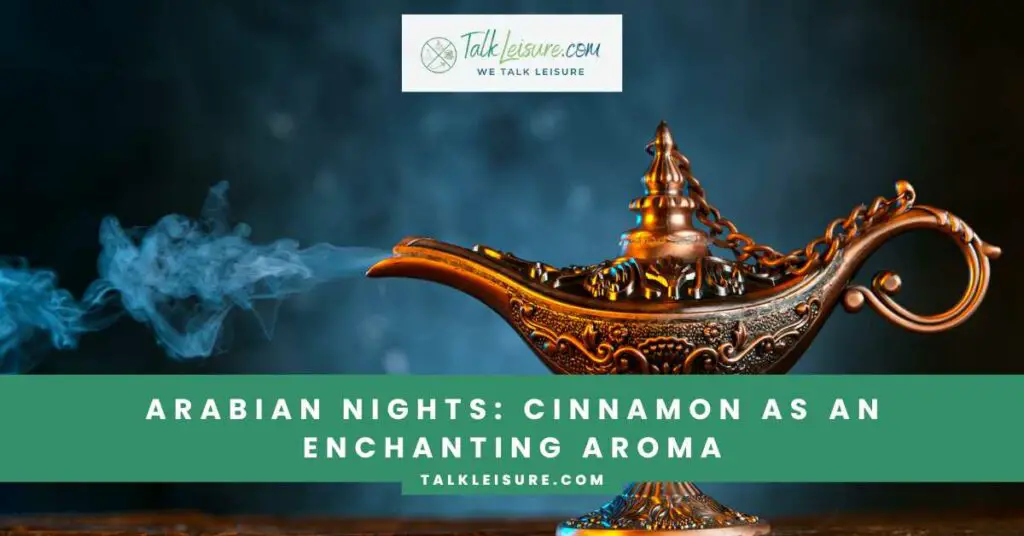
Cinnamon’s Presence in Arabian Folklore and Literature
– In Arabian folklore and literature, cinnamon holds a significant place.- It is often mentioned in the famous collection of stories known as Arabian Nights.- Cinnamon is portrayed as a magical and enchanting spice, captivating the senses of those who encounter it.- Its intoxicating aroma is said to transport individuals to exotic lands and awaken their deepest desires.- Cinnamon is frequently used as a symbol of desire, passion, and sensuality in Arabian tales.
The Sensual and Captivating Allure of Cinnamon
– The distinct aroma and sweet taste of cinnamon contribute to its sensual and captivating allure.- It is often used in perfumes, creating an enthralling scent that lingers in the air.- Its warm and comforting flavor adds depth to dishes and beverages, enhancing their overall appeal.- Cinnamon’s sensual qualities have made it a popular ingredient in romantic and indulgent desserts.- The mere presence of cinnamon evokes feelings of warmth, comfort, and exoticism.
Cinnamon’s enchanting qualities captured the imagination of Arabian cultures, where it became intertwined with tales of love, desire, and enchantment. Its sensual aroma and taste continue to captivate individuals, adding depth and allure to various culinary creations. Whether enjoyed in the form of a spicy dessert or a comforting cup of tea, cinnamon’s presence is sure to transport individuals to a world of sensory delight.
Native American Traditions: Cinnamon as a Sacred Herb
Cinnamon’s Spiritual Significance Among Native American Tribes
– Cinnamon holds a sacred place in the traditions and beliefs of various Native American tribes.- It is seen as a powerful herb that has the ability to connect individuals with the spiritual realm.- The aroma of cinnamon is believed to attract positive energies and bring about spiritual awakening.- It is often associated with purification and cleansing rituals, both for individuals and sacred spaces.- Cinnamon is considered a symbol of protection, warding off negative energies and promoting harmony.
The Use of Cinnamon in Rituals and Ceremonies
– Native American tribes incorporate cinnamon into various rituals and ceremonies.- It is commonly used in smudging, where dried cinnamon sticks or powder are burned to cleanse the atmosphere.- Cinnamon is also utilized in sweat lodge ceremonies, where its aroma and properties are believed to enhance spiritual connections.- It is believed that the scent of cinnamon can help individuals enter a deep meditative state and connect with their ancestors.- In some Native American cultures, cinnamon is used as an offering to show respect and gratitude to the spiritual forces.
Cinnamon plays a significant role in the spiritual practices of Native American tribes, symbolizing purification, protection, and spiritual awakening. Its aromatic qualities are believed to attract positive energies and foster connections with the spiritual realm. Through its use in rituals and ceremonies, cinnamon continues to hold a sacred place in Native American traditions, bringing individuals closer to their cultural heritage and spiritual beliefs.
Conclusion
The spiritual significance of cinnamon goes beyond Native American traditions.
Throughout history, cinnamon has been revered and celebrated by various cultures across the globe.
Its unique aroma and medicinal properties have made it a sought-after spice, both for culinary and spiritual purposes.
It has been used in religious ceremonies, healing rituals, and even as a symbol of power and wealth.
The legends and myths surrounding cinnamon highlight its universal appeal and influence.
Today, cinnamon continues to be cherished and incorporated into cultural practices worldwide, showcasing its enduring impact on humanity’s spiritual journey.

